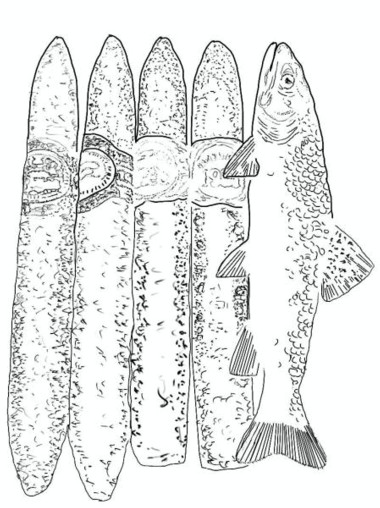An admission: I haven’t tried any of the recipes in southern Vermont author Rebecca Coffey’s book of dishes by authors.
I also hope to keep it that way, because things could get complicated. Take, for instance, the book’s first instruction, step one of a cake purportedly offered by Nietzsche: “Allow angels to reach room temperature. Kill them.” The next steps are “Kill God. Set Him aside,” and “Preheat the oven to 375 degrees.”
Read the table of contents of Nietzsche’s Angel Food Cake …and Other “Recipes” for the Intellectually Famished, and you’re likely to chuckle aloud at offerings like Anaïs Nin’s Hot Cross Buns, Geoffrey Chaucer’s Stinking Bishop’s Tart, Harper Lee’s How to Kill a Mockingbird, and the cream of the crop, John Steinbeck’s Crêpes of Wrath.
The list of dishes would, on its own, be enough to illustrate Coffey’s gift for humor. It seems like a collection of punchy jokes that’s self-sufficient. To take the joke a giant step further by actually creating the recipes would be, for most writers, a giant step right onto a banana peel, like continuing a joke after the punchline’s delivered. A whole book of such stuff sounds like a task beyond hope.
Coffey, however, is no amateur. She’s a science journalist who’s contributed to Discover and Scientific American and blogs for Psychology Today. Her chops clearly go well beyond talking about science with clarity. She takes on the weird task of using the recipe form to send up authors with blazing wit and deft parodic talent. It’s a winning formula. Or, well, recipe.
Coffey sends up some wildly different writers, and takes on nearly all with the same dead-on skill; it takes a talented crafter of prose to parody Ernest Hemingway, James Joyce, Anaïs Nin and Ayn Rand. She does so while evoking laughs at a breakneck pace. Don’t worry if you haven’t read every author. Though it can deepen the experience, it’s not necessary—the jokes work all the same.
In a recent conversation, Coffey explained that getting sick a year or so ago ended up putting her out of commission, but also gave her space to cook up her book: “I was a chief contributor at Discover to the ‘20 Things You Didn’t Know About…’ space. They thought of me as the funny one. I ended up really appreciating the humor potential of lists. And recipes are really funny little lists.”
“The first recipe that I wrote was before I got sick—that’s because I was in love with McSweeney’s [Internet Tendency] lists,” says Coffey. “I wrote Nietszche’s Angel Food Cake and sent it in—he got back to me so fast I thought my email had bounced!
“Freud’s 10 Steps to Great Fish was second, and the next two were Anaïs Nin and Ayn Rand. Once those four got placed more easily than pouring a glass of water, I realized I had a formula.”
To write like the authors, Coffey had to do a fair bit of reading first. She says the process wasn’t overly careful. “With humor, you just go for it shamelessly. I would just grab stuff,” says Coffey. “I think of it in terms of hurling the recipe and the notes I’d made against the same wall, and then sweeping up whatever fell down.”
She does, she says, have a favorite. “F. Scott Fitzgerald’s [Pickled Tomatoes] makes me giggle. That was my rule of thumb—if something was coming with great difficulty, I had to throw it away,” she explains. “It had to be easy or it wasn’t going to be funny. If the title didn’t just descend on my like a bolt out of the blue and make me laugh so hard I couldn’t walk, it wasn’t worth pursuing.
“And I had a really good pickled tomato recipe.”
Still, they didn’t all come as easily. “The one that was hardest for me to write was Lewis Carroll,” says Coffey. “Everyone thought I should have one. I struggled with that one and I had to turn it into a logic puzzle.”
Coffey is a busy creator—she’s taken up a new challenge, making an animated film of Nietzsche’s kitchen work. And next May, she has another book coming out, a novel called Hysterical: Anna Freud’s Story. In it, she imagines Freud’s daughter growing up in a particularly tough bind. All the same, the book is “serio-comic.”
“The evidence shows that she was probably gay,” Coffey says. “So she was growing up Sigmund Freud’s daughter, gay, being psychoanalyzed by her father. Her coping mechanism was humor.”•
Sigmund Freud’s 10 Steps to Great Fish
1. Buy a dead fish. When the eye stares at you accusingly, think forbidden thoughts. Why not?
2. Wait until you are alone. Then smear the fish with Béchamel sauce.
3. Béchamel. The very syllables take my breath away.
4. Cook the fish any way you like, but serve it with bloody beets.
5. Please remove the bones very gently.
6. Lemon makes me pucker. You?
7. All right. How does this make you feel? When fish cooks, the proteins denature and then coagulate.
8. There’s a delicate balance between perfectly cooked fish and overcooked fish. Does this remind you of anything in your goyishe childhood, like perhaps the Christmas morning when you were three and your mother was disappointed to find nothing for her from your father under the tree but mounds of gifts for you, and she cried as she sifted through the balled up pieces of wrapping paper looking for something, anything, but found nothing there? And when you saw her breasts heaving and heaving and heaving some more, you cried, too? And then you ran into your room and looked at yourself naked?
9. Don’t pound the fish. Please don’t pound the fish. Just touch the fish.
10. Change your clothes.



